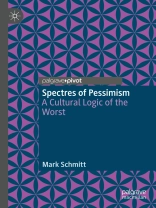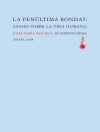This book argues that philosophical pessimism can offer vital impulses for contemporary cultural studies. Pessimist thought offers ways to interrogate notions of temporality, progress and futurity. When the horizon of future expectation is increasingly shaped by the prospect of apocalypse and extinction, an exploration of pessimist thought can help to make sense of an increasingly complex and uncertain world by affirming rather than suppressing the worst. This book argues that a cultural logic of the worst is at work in a substantial section of contemporary philosophical thought and cultural representations.
Spectres of pessimism can be found in contemporary ecocritical thought, antinatalist philosophies, political thought, and cultural theory, as well as in literature, film, and popular music. In its unsettling of temporality, this new pessimism shares sensibilities with the field of hauntology. Both deconstruct linear narratives of time that adhere to a stable sequence of past, present and future. Mark Schmitt therefore couples pessimism and hauntology to explore the spectres of pessimism in a range of theories and narratives—from ecocriticism, antinatalism and queer theory to utopianism, from afropessimism to the fiction of Hari Kunzru and Thomas Ligotti to the films of Camille Griffin, Gaspar Noé, Denis Villeneuve and Lars von Trier.
Jadual kandungan
Chapter 1: Introduction: “Being for Being Against”: Pessimism and the Cultural Moment.- Chapter 2: Pessimism of Theory, Optimism of Practice: Critical Theory vs. Cultural Studies.- Chapter 3: Utopia Banished? Apocalyptic Pessimism and Utopian Optimism.- Chapter 4: The Kids Will Not Be Alright: Futurity, Pessimist Temporality and Procreation.- Chapter 5: Embracing Extinction: Cosmic Pessimism, Crumbling Modernity and Ahuman Futures.- Chapter 6: Conclusion: The Virtues of Pessimism.
Mengenai Pengarang
Mark Schmitt is Assistant Professor at the Department of Cultural Studies at TU Dortmund University, Germany.












